|
A Virtual Walk Through Jacksonville History
Stop 34: Masonic Hall
Just a few steps over to California Street and we reach our next stop, the home of Warren Lodge No. 10, Free and Accepted Masons of Jacksonville.
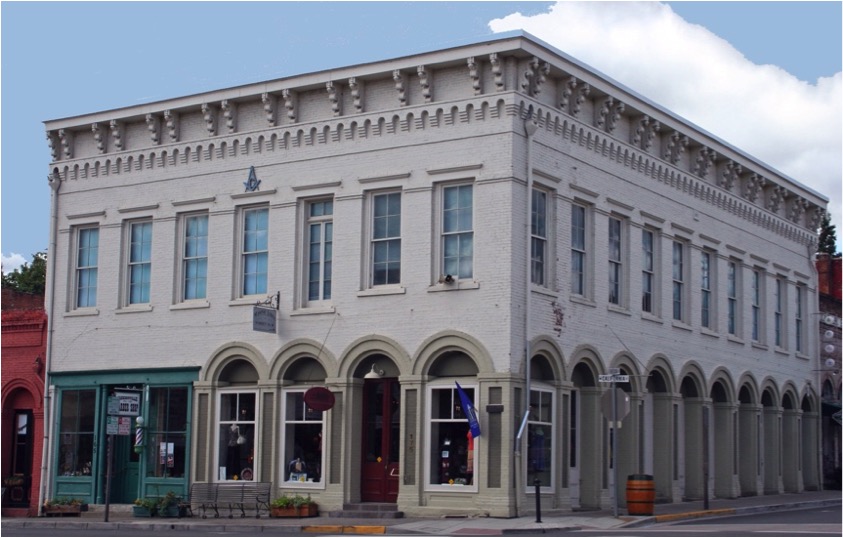
This two-story, rectangular building was constructed between 1874 and 1877 by local brick and stone mason, George Holt, according to the Oregon Historical Survey. The architect is unknown. The original building was painted a dark red, with a lighter color accenting brackets and window trim. A second-floor balcony extended the length of the north and west facades, as can be seen in this photograph dating from the 1880s.
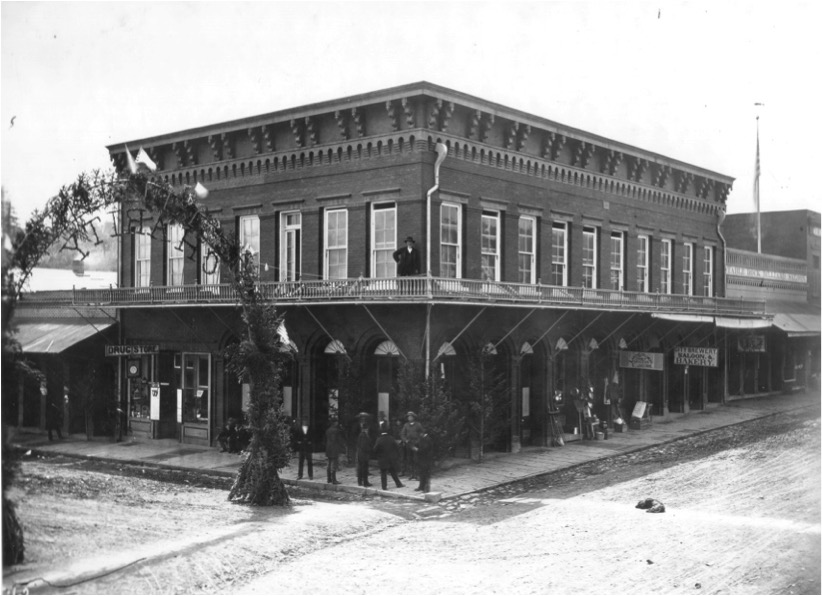 Jacksonville’s Masonic Hall, 1880s. Photo Source: SOHS #699. Jacksonville’s Masonic Hall, 1880s. Photo Source: SOHS #699.
This corner was the original location of many of Jacksonville’s first businesses, including the notorious Eldorado Saloon. Home to “gamblers, courtesans, and sharpers of every kind, the saloon fronted on Oregon and extended 100 feet along California Street. This, and many neighboring wooden structures burned to the ground in the morning hours of April 14, 1874.
In August of 1874, the Masons agreed to buy the three lots, known as the Eldorado lots, which make up this corner of California and Oregon Streets. The first lot was purchased from Mr. and Mrs. W.A. Owen and Mr. and Mrs. Alexander Martin (both men members of the Lodge) for approximately $800. The second lot was purchased from Viet Schutz and his wife for one dollar. The third lot, next to the Table Rock Saloon which survived the fire, was purchased from James Cluggage for $450. For his generosity, Veit Schutz gained occupancy rights to the ground floor space next to the Table Rock Saloon and paid for the construction of that segment. Schutz operated a brewery at this location for a time.
The Masons did build a second story onto this third lot but didn’t own this part of the building until February 1946, when Emil Britt deeded it to the Lodge for (you guessed it) one dollar. [Note: Henry Halverson’s history of the Warren Lodge states that it was David Linn who built the Lodge on the first two lots and extended the second story over the third lot.]
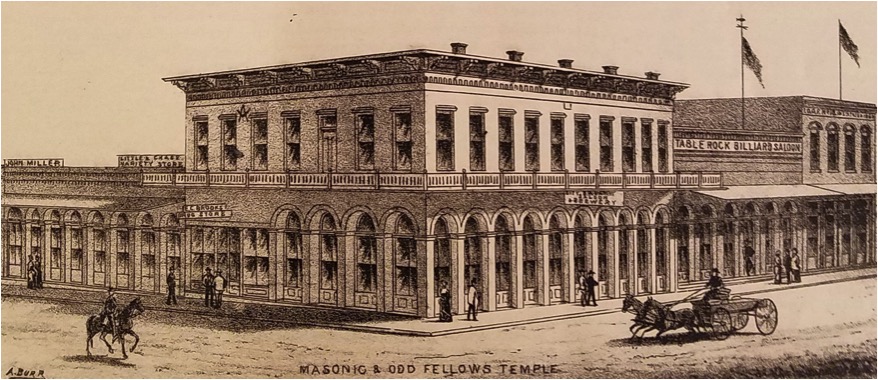 Jacksonville’s Masonic Hall. Lithograph Image from The West Shore Magazine, August 1883. Jacksonville’s Masonic Hall. Lithograph Image from The West Shore Magazine, August 1883.
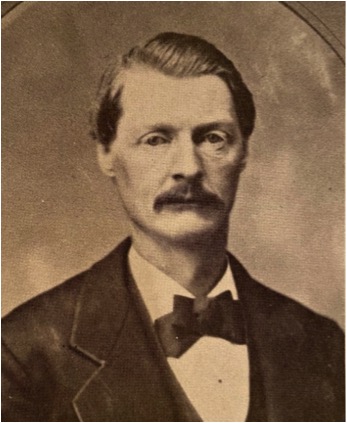
Thomas J. Reames, Worshipful Master 1870-1876
Photo Source: The Lodge:
Jacksonville Masonic Fraternities.
|
At the time of construction, the Worshipful Master presiding over the Warren Lodge was Thomas Reames (Stop #14), having been elected in December of 1870 and serving in that capacity until December 1876. Reames is credited with the concept of including retail space on the first floor of the Lodge which enabled the Lodge to operate from income received from the rentals.
The first Masonic function performed in the new building was the installation of Reames’ successor, C.C. Beekman (Stop # 15) on December 27, 1876. The lodge wasn’t yet finished, but the ceremony took place there before the members returned to the Odd Fellows Hall/McCully building, which they had been renting until completion of Temple. Beekman had been made a Master Mason in the Yreka Lodge, and transferred to the Jacksonville Warren Lodge in 1860.
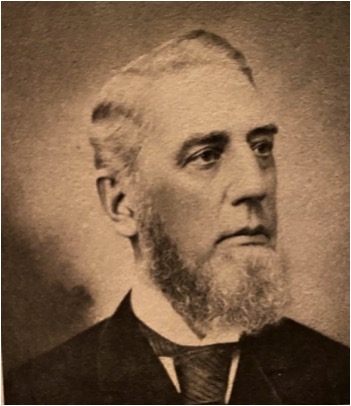
C.C. Beekman
Worshipful Master 1876-1888
Photo Source: The Lodge:
Jacksonville Masonic Fraternities.
|
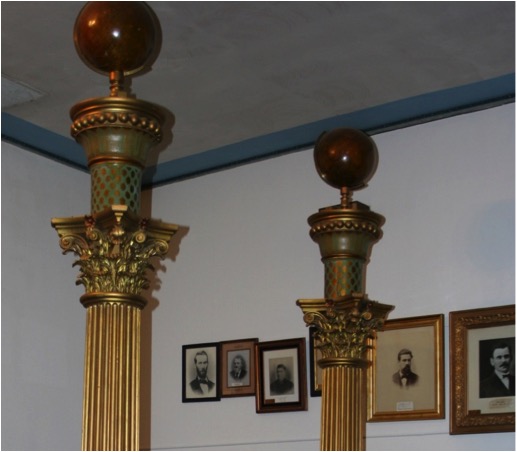 |
While he was Worshipful Master, Beekman provided the lodge with its symbolic Fellowcraft pillars, which are topped by two globes given to the Lodge in 1861 by John Anderson. The bases of the pillars were made by David Linn.
Many of Jacksonville’s pioneers were members and Worshipful Masters of Warren Lodge No. 10, including John Ross, Nat Langell, David Linn, Henry Kubli, and William Colvig. Many more were members and served in other capacities. Max Mueller (Stop #13) served as Secretary for thirty-two consecutive years!
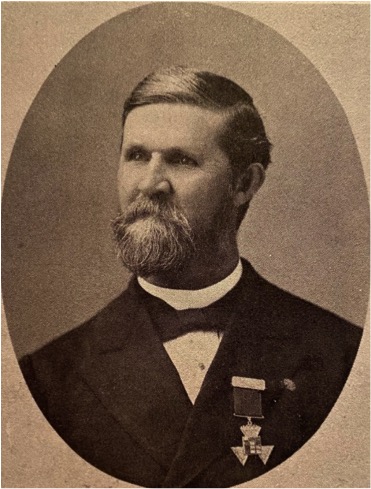
Thomas McFadden Patton
First Worshipful Master
Photo Source: The Lodge:
Jacksonville Masonic Fraternities.
|
The Warren Lodge No. 10 is named for Joseph Warren, a distinguished Mason who fought and died in the battle of Bunker Hill in 1775. Warren presided over the Grand Lodge of Massachusetts in Boston, which was first instituted in 1773 and, at the time of his death, was The Grand Master of the Continent of North America.
Jacksonville’s Warren Lodge was chartered on June 15, 1855, and the first meeting under the charter was held August 25, 1855. Its first Worshipful Master was Thomas McFadden Patton.
Patton came to Jacksonville from Salem in the spring of 1853, and as early as March of that year he was appointed prosecuting attorney for Jackson County. After serving in other capacities in county government for two years, he returned to Salem. He was later elected Grand Master of Masons in Oregon in 1872-74.
The first home of the Warren Lodge was a two-story wooden structure on the site of Jacksonville’s New City Hall, the historic Jackson County Courthouse (Stop #1). Constructed around 1858, the ground floor of the building was leased to the County to serve as a courthouse and the Masons used used the second story as their meeting hall. They occupied the space until 1868 when they sold the building to the County. (You may recall this was the building later decreed to be unfit for a cow shed and sold to Gustav Karewski).
In 1968, the Lodge erected a monument near the space where the building once stood, to commemorate the first Masonic Temple in Southern Oregon.
After selling their first Temple, the Masons met at the Odd Fellows’ Hall until the building at California and Oregon was completed.
In May of 1955, the Warren Lodge observed its Centennial, and an article appeared in the Oregon Freemason to commemorate this milestone, offering homage to Jacksonville as well as the Lodge:
“Jacksonville, home of Warren Lodge No 10, looms large in pioneer history. Other communities have outdistanced it, and the County seat is gone elsewhere, but no one can take from it the lore of early days, nor the distinction of being the first lodge in Southern Oregon …. The pioneers will not be there for the Centennial, but their work will be apparent. They were upstanding, resourceful, forthright men, and they deserve recognition and remembrance during this historic event.”
Sources Cited
Evans, Gail E.H. State of Oregon Inventory of Historic Properties, “Masonic Building, Warren Lodge No. 10,” November 1979.
Halvorsen, Henry H. Early History of Warren Lodge No. 10: Ancient Free and Accepted Masons, Jacksonville, Oregon: from 1855 to 1877. 1978.
Halvorsen, Henry H., and Marguerite Black. The Lodge: Jacksonville Masonic Fraternities: Warren Lodge No. 10 A.F. & A.M., Oregon Chapter No. 4 Royal Arch Masons, Adarel Chapter No. 3 Order of the Eastern Star, Warren Assembly No. 84 International Order of Rainbow for Girls, with Index. Reflected Images, 1991.
|